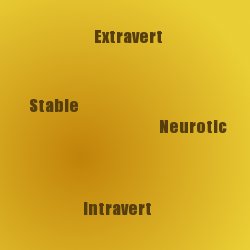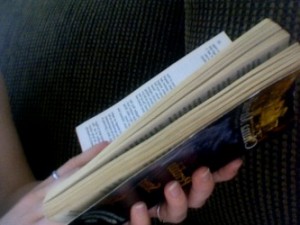Emotional intensity and the individual
Let's say you're at home. Maybe you're lounging indolently on the couch, feet up on the brown wood coffee table, television whining at you from across the room. Maybe you're cooking tonight's dinner, chopping vegetables with careful strokes, sliding the ever growing pile of peppers and onions and tomatoes into a hissing frying pan. Maybe not. Maybe you're in another room when the fire alarm sounds, bleep bleep bleep, blaring its cacophonous melody into your generally peaceful home.
How do you react?

Do you scream? Do you calmly turn off the stove, flap a towel at the cloudy air around the smoke detector, and wait patiently for it to detect that there's not actually a fire? Do you leap up from the couch, tripping over the coffee table in your panic, terrified of burning to death in your own living room?
The strength of your emotional response to this (or any) emotional stimulus is known as emotional intensity. Emotional intensity can be measured with psychological scales, such as the aptly-named Emotional Intensity Scale (EIS) developed by Bachorowski & Braaten (1994) [PDF]. The underlying if obvious assumptions of these scales are that some individuals experience all of their emotions more intensely than other individuals, and all individuals may respond with different strengths to the same stimuli.
Your personality influences your experience of emotions
You may already be familiar with the Big 5 personality factors: Openness, Conscientiousness, Extraversion, Agreeableness, and Neuroticism (sometimes called Emotional Stability). (If not, look them up.) Robert McFatter, in his 1998 paper Emotional Intensity: Some components and their relations to extraversion and neuroticism [PDF], investigated the relation between temperament and the intensity of positive and negative emotions. (Positive emotions included happiness and pleasure; negative emotions included worry, guilt, anger, and sadness.) McFatter described and tested several models, all of which had slightly different predictions about how neuroticism, extraversion, and positive and negative emotional intensity are correlated.
-
Larsen & Ketelaar model: The measures used to examine emotional intensity in this model tapped frequency of experienced emotions more than the intensity of single (and possibly infrequent) reactions. The model predicts that Extraversion is positively related to positive intensity and unrelated to negative intensity, and that Neuroticism is unrelated to positive intensity and positively related to negative intensity.
-
Larsen & Diener model: This model draws on the theory that the intensity of experienced emotions is used to regulate arousal levels. Arousal level can be tied to Extraversion, so this model predicts that Extraversion is positively related to both positive and negative intensity. Larsen & Diener also predict that Neuroticism is similarly positively correlated with positive and negative intensity.
-
Wallace, Bachorowski, & Newman (WBN) model: Extraversion is suggested to reflect a behavioral approach system and a behavioral inhibition system. Neuroticism is suggested to reflect the reactivity of an arousal system responding to the behavioral approach/inhibition systems that serves to prepare the individual to respond. This model accordingly predicts that Extraversion is positively related to positive intensity and negative related to negative intensity (and thus that Extraversion is overall uncorrelated with overall emotional intensity), and that Neuroticism is positively related to both positive and negative intensity.
-
Gray's model: This model predicts that the behavioral approach/inhibition systems form dimensions that are rotated roughly thirty degrees from the Extroversion and Neuroticism dimensions, so they don't line up. The model predicts that Extraversion is positively related to positive intensity but only weakly negatively related to negative intensity. Similarly, Neuroticism is predicted to be weakly positively related to positive intensity, and positively related to negative intensity. Gray's model, furthermore, suggests that the negative emotions can be subdivided into anger/panic and anxiety/fear categories. These subcategories may have different relations to Extraversion.

Methods, Correlations, Analyses, Results
To test these models, McFatter gave a series of questionnaires to 1553 college students taking introductory psychology classes (596 male). Participants completed the 30-item EIS to examine positive and negative emotional intensity (14 items and 16 items, respectively), the Eysenck Personality Inventory (EPI) for measuring Extraversion and Neuroticism (in addition to subscales for impulsivity and sociability), and a third unrelated questionnaire.
Based on an initial factor analysis of the EIS, negative intensity was separated into two groups: anger/frustration (hereafter referred to as "anger intensity") and non-anger, such as worry, guilt, and sadness (referred to as "non-anger intensity"). This result supports Gray's theory that two separate negative emotion systems exist.
Consistent with both Gray's model and the WBN model, Extraversion was shown to be positively related to positive emotional intensity (r=0.19, P<0.0001), negatively related to non-anger emotional intensity (r=0.18, p<0.0001), and unrelated to anger intensity (r=0.02). In plainer terms, individuals with high Extroversion scores tended to experience more intense positive emotions and less intense negative emotions. Neuroticism, on the other hand, was shown to be positively related to all three kinds of emotional intensity, though less strongly to positive intensity (r=0.18, p<0.0001) than to non-anger or anger intensity (r=0.56,p<0.0001 and r=0.45,p<0.0001, respectively). That is to say, individuals with high Neuroticism scores tended to report experiencing more intense emotions overall. This is consistent with Gray's model. A couple other interesting results: Females reported significantly higher emotional intensity than males overall, with the largest difference seen in negative intensity (0.411, p<0.0001). The positive relation between Extraversion and emotional intensity was stronger among people with a high Neuroticism score.
Neuroticism and emotional intensity
It's hard to tell without reading a pile of psychology papers, but the fact that Neuroticism was positively related to positive emotional intensity was surprising. Previous results found a negative relation, though several of these had measured emotional intensity with a different scale--one that seemed to confound frequency and intensity of the experienced emotions. The WBN model, relatedly, claimed that Neuroticism reflected general emotional reactivity. (Recall the personality factor's other name: Emotional Stability.) So McFatter investigated.
He found that when looking at the difference of the positive intensity and negative intensity scores, the relative emotional intensity was negatively related to Neuroticism, as in those previous studies. However, when examined on their own with the other variables controlled, the relations of both positive and negative intensity to Neuroticism were positive. The WBN model only explained a portion of the story.
McFatter's results, overall, support Gray's model and the WBN model, suggesting that the variations in positive and negative emotional intensity may be the result of separate emotion systems, but that they do have some common variation that may best be explained by their relations to Neuroticism.
References:
McFatter, R. (1998). Emotional Intensity: Some components and their relations to extraversion and neuroticism. Person. individ. Diff., 24(6): 747-758. [PDF]









